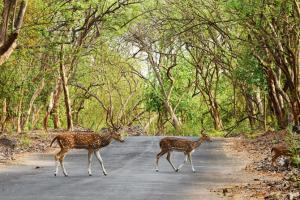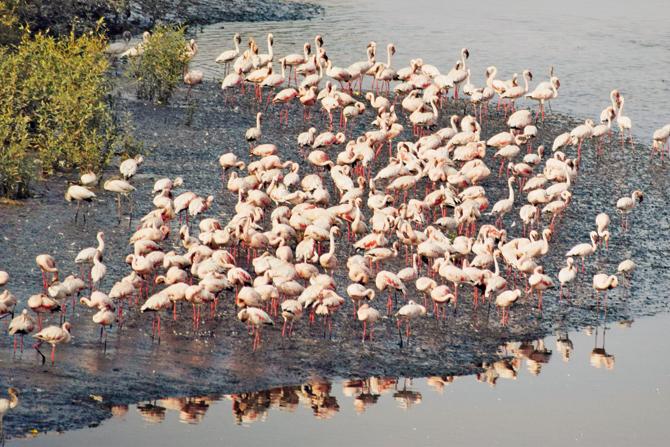Environment Impact Assessment Report mentions that construction workers having greater accessibility to forested areas along the corridor might poach animals

The bullet train project might also adversely impact the flora and fauna of SGNP
One of the major risks that the proposed Mumbai-Ahmedabad High Speed Rail (MAHSR) project poses to the wildlife thriving in the forested patches of the Sanjay Gandhi National Park (SGNP), Tungareshwar Wildlife Sanctuary (TWS) in Vasai and Thane Creek Flamingo Sanctuary, as per the Environment Impact Assessment (EIA) report prepared by the National High Speed Rail Corporation (NHSRC), is poaching by construction workers.
"Construction workers having greater accessibility to the forest areas along the corridor might lead to poaching activities," states the report. It further mentions that the undersea tunnel, which would be constructed near the flamingo sanctuary, might have adverse impacts on the birds. Construction work might destruct the mud flats and high speed of trains might affect the birds as well, it states.

The Thane Creek Flamingo Sanctuary. File Pics
Along with the EIA report, the NHSRC submitted the proposal for getting environment clearances for the project to the MoEF&CC on March 14, 2019. The report not only mentions the environmental impacts during the construction and operational phases, it also talks about the mitigation measures to be taken.
Impact on fauna (construction phase): The report mentions that noise and vibrations generated by construction equipment and machinery might affect the aquatic animals and avifauna. Removal of trees might also destruct birds' nests and breeding sites. "Increased sediment loads during construction of bridges might impact the aquatic fauna due to temporary loss of habitat and reduced water quality and flow."
Mitigation measures: "Noise and vibrations at the construction site should be minimised to avoid impact on local fauna. All major noise-producing construction equipment/machineries should be fitted with acoustic control measures," the report says.
Impact on fauna (operational phase): "Division of habitats could affect the range of faunal population and its distribution, ability to mate and connectivity between populations. Accidental oil and chemical spills might impact the animals as well."
Mitigation measures: "Immediate action should be taken for speedy cleaning up of oil spills, fuel and toxic chemicals in case of accidents. Underpasses should be constructed for animals where the corridor passes through forested patches. The proposals should be discussed with the local forest department or local NGO to determine the location, frequency, basic design and number of crossing structures to be constructed," states the EIA report.
Impact on protected areas (construction phase): The EIA report states, "Construction of the corridor will affect the mangrove species which are difficult to conserve. Felling of some endangered species of trees along the corridor near SGNP and TWLS could adversely affect conservation and lead to habitat fragmentation."
Mitigation measures: Compensatory plantation should be initiated for endangered species on degraded forestland within SGNP as per the guidelines of the State Forest Department. "Water holes at strategic points will be developed in consultation with the SGNP authority. This should be done inside the forest to encourage movement in those areas. A comprehensive management and conservation plan for the Thane Creek Flamingo Sanctuary shall be formulated and implemented."
Impact on protected areas (Operational phase): EIA also states, "The MAHSR trains might hit wildlife (particularly avifauna) near the protected areas since they will run at a speed of 320 to 350km/hr on the viaduct at a height of 10-15 metres. Formation of eddy current due to the shape of the train might have adverse impacts on the wildlife."
Mitigation measures: "Incorporate underpasses, pipe culverts and/or other structures as needed to allow wildlife to cross safely in the design. Crossing structures should be constructed in consultation with the SGNP and TWS authorities," mentions the report.
Environmentalist Stalin D from NGO Vanashakti said, "This project needs serious reworking and cannot be allowed to destroy wildlife habitats. The route needs to be aligned away from sanctuaries. Mumbai has two protected areas the SGNP and The Thane Creek flamingo sanctuary. Both these areas need to be kept completely inviolate. Already there are three massive garbage dumps in the flamingo habitats. The government is brutally, illegally and unconstitutionality destroying wildlife habitats and forests mindlessly and needlessly."
Kedar Gore, Conservationist and Director of The Corbett Foundation, said, "The Bullet Train project is thrust upon by the Government. It is unnecessary and this money could have been sought for something more useful for common citizens. Mumbai’s suburban railway lines need upgradation on several fronts and addressing these would be much more useful for people. However, the government thinks otherwise. Bullet train route will cut through several forest areas around SGNP, Tungareshwar and Vasai-Manor, etc. Disturbance created by bullet train, laying of tracks through forests, etc will have serious impact on these forests that act as dispersal areas for leopards and other wild animals. Not only birds, but lives of several wild and domestic animals/free-roaming cattle will be at stake due to collisions. Influx of construction workers is a threat that has been largely overlooked in the last few years. They may be involved in hunting and poaching. Worse than this, these workers may end up settling in / near forest areas by erecting hutments that may eventually be regularised using political pressure. Protecting our nature resources and heritage is much more important than political whims and fancies that thrust unsustainable projects using the garb of pseudo-development. Providing safe drinking water to all people, providing safe and comfortable public transport system, easy access to affordable healthcare, better agricultural techniques to increase farmers’ yield, better management of rainwater to recharge groundwater, are some of more pressing fundamental needs that India needs to address than such expensive infrastructure that would benefit perhaps only few people."
Catch up on all the latest Mumbai news, crime news, current affairs, and also a complete guide on Mumbai from food to things to do and events across the city here. Also download the new mid-day Android and iOS apps to get latest updates
 Subscribe today by clicking the link and stay updated with the latest news!" Click here!
Subscribe today by clicking the link and stay updated with the latest news!" Click here!







